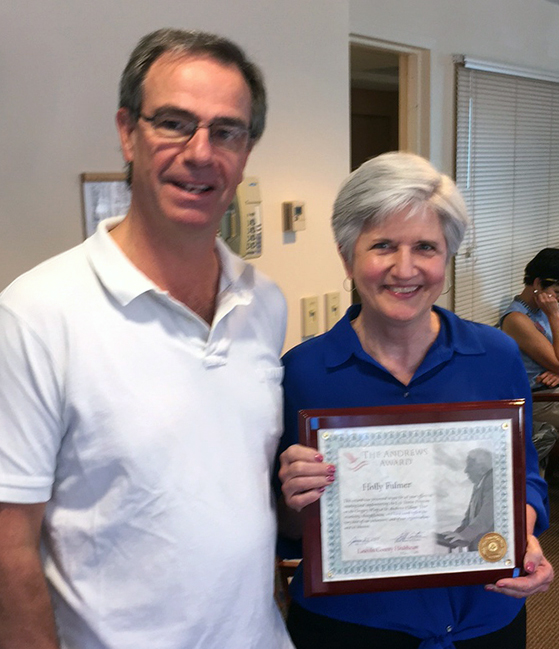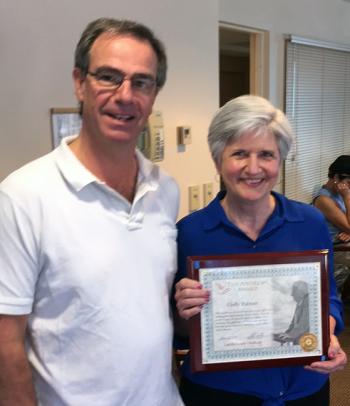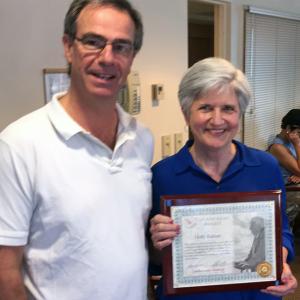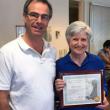Volunteer Holly Fulmer receives first Andrews Award
One resident of the Gregory Wing, a U.S. Navy veteran, proposed to his future wife while they were both flying upside down in a plane he built himself. He only turned it right-side up after she said “yes.”
Another resident, also a veteran, played practical jokes on his fishing buddies, swapping out the fish they caught so he always had the prize. As he told the story, he laughed until tears flowed down his face.
“Life Stories,” one-page descriptions of the milestones, accomplishments and memories of Gregory Wing residents, has changed the way volunteers and visitors see residents and helped residents relive parts of their lives that they had almost forgotten.
Written by volunteer Holly Fulmer, with help from Activities Coordinator Jerie Phinney, the framed stories hang in the rooms of most long-term care Gregory Wing residents, each with a photo of the resident, often with family members and often taken during their heyday.
The process of choosing the photos and writing the stories starts conversations within families, said Phinney.
Fulmer received The Andrews Award for her work with “Life Stories” and for her dedication providing pet therapy to the Gregory Wing over the years.
She is the first recipient of the Award, named for beloved Boothbay area family physician John Fraser Andrews Sr., who died at 94 last year. Andrews served the Boothbay region for more than 40 years, delivering an estimated 800 babies before he retired in 1996. He also served as medical director of the Gregory Wing.
Phinney said many of the residents and their families enjoy the process of recounting old memories with Fulmer just as much as they like the finished product.
“They (the residents) all love to talk about their history and they laugh and they remember and later on they come back with more information,” she said.
Remembering special moments can be mentally stimulating to residents and bring back happy memories, improving their mood and frame of mind.
The gentleman who enjoyed playing practical jokes on his fishing buddies can sometimes have difficulty communicating. As he and his wife recounted the stories, however, his voice got clearer, his eyes opened up wider and his posture improved, said Phinney.
Another woman who initially couldn’t believe that anybody would want to write about her life was so pleased with the results that she asked for several copies to give to family members as Christmas presents.
Phinney said the one-page biographies have also made a difference in other ways.
CNAs and volunteers who spend time with the residents often read them to better understand residents or to find conversational gambits.
“It is a very human touch and a way to connect to people and let them know that you care and you are interested,” she said.
Fulmer, who volunteers at the Gregory several days a week with her Boston terrier, Lexi, is a well-known figure at the facility.
“She is so consistent that even people who have short-term memory problems will recognize her and Lexi. They will look up and their faces will brighten up and they will wave her over,” said Phinney.
Phinney said she is amazed at Fulmer’s persistence and commitment, both in providing pet therapy and collecting the information for the stories from residents and their families.
“It is just a really powerful tool for everyone,” she said.
Event Date
Address
United States

























